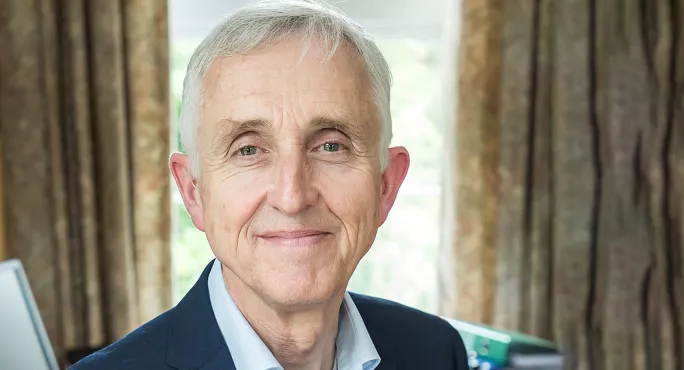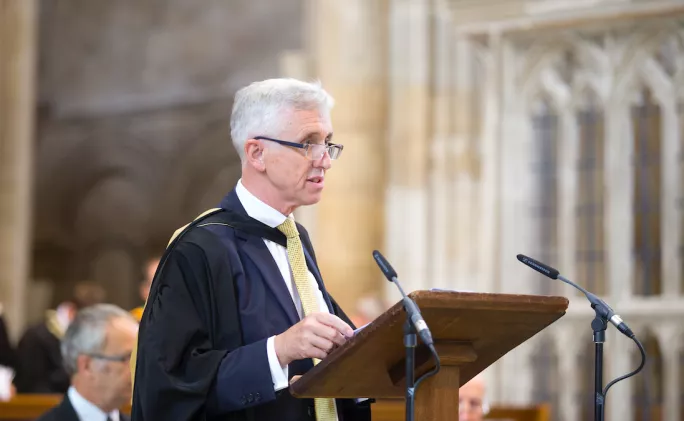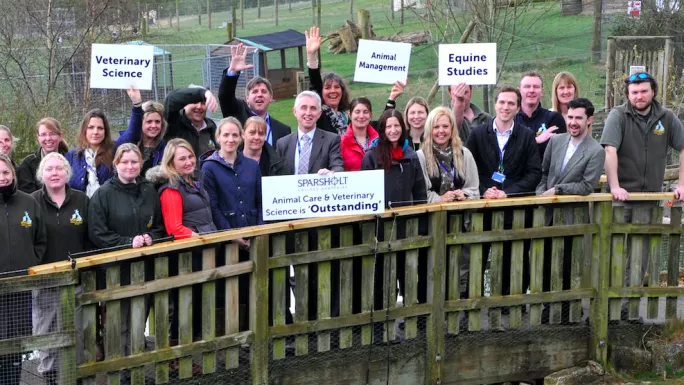Meet award-winning Tim Jackson: the humble leader

Tim Jackson takes his Tes FE award down from the shelf and bashfully shows it to me.
“Here it is: it’s a proper job,” he laughs. “It’s so nice because it’s something that colleagues have obviously gone out of their way to nominate me for and they know that I find this sort of stuff toe-curlingly embarrassing. I hate it really. And yet, at the same time, you can’t help but respect and appreciate the effort that they put into it, and it’s really, really nice for them to have done it. So I accept it thoroughly, recognising their intent was absolutely good, but squirming a bit as well.”
Last summer Jackson retired as principal of Sparsholt College, in Hampshire, after 22 years. His reaction to receiving his Tes FE lifetime achievement award two months ago mirrors his leadership: not one to put himself in the spotlight, he always focused on the team around him, recognising the importance of valuing his colleagues, and singing their praises.
The title of his award couldn’t be more apt: Jackson has, quite literally, dedicated most of his life to Sparsholt, spending an astonishing 34 years either teaching at or leading the college. And although he hung up his principal shoes in summer last year, he isn’t stepping away from further education any time soon. As well as being a governor at Highbury College, he is also an adviser to the FE commissioner’s office, and is keen to support colleges - and their staff - to become the best they can be.
Opinion: We can’t allow FE’s ‘golden generation’ to underachieve
Covid: Easing restrictions - what it will mean for colleges
Background: Tim Jackson wins at the Tes FE Awards 2021
Jackson was born in Essex, before his parents moved to Worcester, in the Midlands. His father was a teacher in the army and the family - Jackson has three sisters - moved to Germany for a few years in the early Sixties, before settling back in Worcester. His father went on to teach a combination of science, environment and practical gardening skills at the local university, and his mother was an orthoptist.
“I remember my father saying to me, ‘Well, what do you want to do for your future?’ And I said, ‘Nothing to do with education or horticulture!’ only to find myself spending 38 years doing just that,” he laughs.

Innovation in FE college leadership
He says the course had a big emphasis on technology and food, and looked ahead to the future of crop production. Innovation really ignited a passion in him - and it is something he embedded in his own teaching later on.
“Young people respond really well to innovation and exciting new things, whether it’s in the arts, humanities or the sciences: it’s about the dynamic,” Jackson says. “If you can tie learning into something which is intrinsically dynamic, and captures what learners’ default interest is, then you’ve got a really good way of leading even the most reluctant learner in the right direction.”
During Jackson’s third year of university, he went on a work placement at the Ministry of Agriculture, Fisheries and Food, and says it was mind-expanding in many ways. The placement got him work-ready - although he stresses that he had had several jobs before university, cutting keys, putting heels on shoes and working on the fruit harvest - and cemented a desire to work in crop protection and technology.
But upon graduation, there was a bump in the road: the industry had taken a real hit and there were no jobs available. And so Jackson followed in his father’s footsteps, and trained to become a teacher.
“I really enjoyed it. It was a sense of not only was the subject of interest to me, but actually being able to teach something and excite other people in taking an interest in it, and having fun while they’re doing it, was so important,” he says. “Fun has always been for me a really important part of helping learning be memorable.”

Jackson taught in Warwickshire for four years, before joining Sparsholt in 1986. Initially, he led a three-year extended diploma in agriculture, and as Sparsholt expanded and grew, so did his portfolio. He became vice-principal, and then principal in 1998.
Dedicating his career to Sparsholt College
In 2007, the college had an opportunity to merge with Cricklade College in Andover, and successfully did so. “It was almost like I had 10 years to learn the job, and then another 10 years of being able to apply it in a different college because the merged college was a very different college,’’ he says.
Jackson says the key to a successful merger is “giving staff a really good listening to”.
“Staff need to feel and understand that you’re listening to them. It’s not just platitudes and looking at your watch to see when the next meeting starts - really, really listening. And I think that’s such an important part of leadership for me: listening and being seen to listen,” he says.
As a leader, Jackson says he lived by the seven Nolan principles of public life: selflessness, integrity, objectivity, accountability, openness, honesty and leadership.
“If you live by those, whether you’re a faculty head, a department head or whatever you are, I think people really respect it,” he says.
“The need to reflect is a really difficult one, but it’s a really important one. Finding the time to reflect is very important, and reflection isn’t just sort of self-contemplation. It’s about the what, how, why questions, and thinking about the organisation in the direction it’s going. Is it making the impact? Is there a different way of doing this? Always questioning, and always looking carefully to see what you are reading or listening to, is the reality.
“Sometimes it may be simply the rhetoric or it may be a misconstrued version of what actually is there. Taking the time to triangulate what you’re reading or hearing to make sure it’s the truth, the whole truth, and not just someone’s perspective which has been slightly distorted by the fact they’ve had a really bad day or a bad year.”
Jackson achieved so much at the college: under his leadership, the college was consistently rated “outstanding” or “good” by Ofsted, and earned University Centre status. His vision ensured that the college thrived in a tight financial climate. Student numbers doubled and the campus expanded, with state-of-the-art facilities including the Aquatic Research and Conservation Centre, the Salmonid Rearing and Trials Centre and the Motor Vehicle Engineering Centre.
Leadership through challenging times
It’s impressive: and even more so when you consider the external climate. Jackson says the last 10 years were extremely tough - and he’s proud to have led a college that celebrates every member of staff, no matter what their role.
“I’m proud to have led an organisation through all the policy change, while also maintaining a really good level of performance and morale among the staff when there was everything to get really angry and upset about,” he says.
“It’s about making sure you walk the floor and talk to people, whatever they do within the college, and talking to everyone equally and not inadvertently or deliberately looking down on anyone because they happen to have a job that’s very much involved in say, cleaning the place. Cleaners are really important to the way the place looks, and you should be congratulating them for doing such a great job.”
His time at Sparsholt ended as the impact of the pandemic really hit, and he says he felt like a “real heel” leaving in July 2020. “I thought, ‘Well, I’ve always stood on the deck with the team in the storm, and been there as part of it,’ and I felt as if I had pressed an ejector seat and had gone to somewhere much calmer,” he says.
And even though he’d officially left Sparsholt as its leader, Jackson did stay on to do some commissioned project work, and so is still fully immersed in the college community.

Sharing expertise as adviser to the FE commissioner
“I’ve seen some really, really excellent practice, even in those colleges which have got, in some cases, into financial difficulty - it doesn’t alter the strength,” he says. “And that’s one of the abiding things about education I’ve always found. It is composed of so many people who are principled about what they’re doing, and who make really conscious choices. And if they’re not doing it as well as they’d like, then usually there’s a listening ear, and a real strong commitment to get it right, and that’s one of the joys of being involved in it.”
And who better for the principals of today to learn from than Tim Jackson: the humble but determined leader, whose success, in the words of his staff, is founded on “his value system, which consists of a strong work ethic, a keen sense of duty, a positive approach and respect for his fellow human beings”.
You need a Tes subscription to read this article
Subscribe now to read this article and get other subscriber-only content:
- Unlimited access to all Tes magazine content
- Exclusive subscriber-only stories
- Award-winning email newsletters
Already a subscriber? Log in
You need a subscription to read this article
Subscribe now to read this article and get other subscriber-only content, including:
- Unlimited access to all Tes magazine content
- Exclusive subscriber-only stories
- Award-winning email newsletters